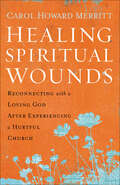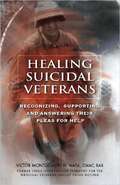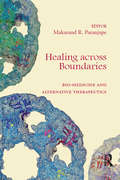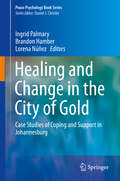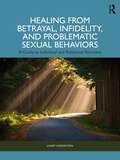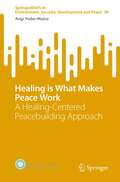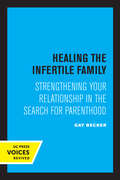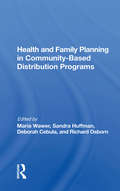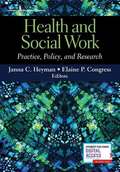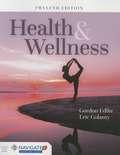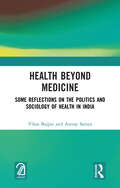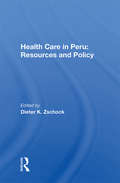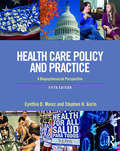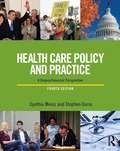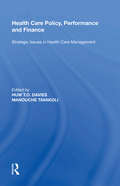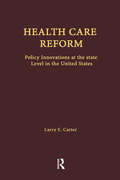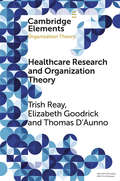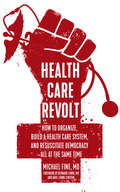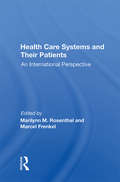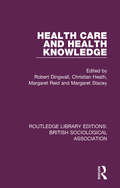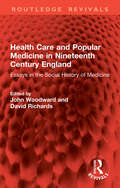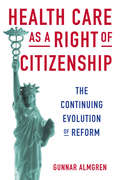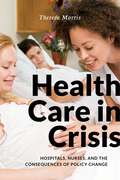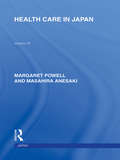- Table View
- List View
Healing Spiritual Wounds: Reconnecting with a Loving God After Experiencing a Hurtful Church
by Carol Howard Merritt“A timely template for reconciling the quest for spiritual fulfillment with our deeply flawed institutions and the people within them.” —SalonRaised as a conservative Christian, minister and author Carol Howard Merritt discovered that the traditional institutions she grew up in inflicted great pain and suffering on others. Though she loved the spirituality the church provided, she knew that, because of sexism, homophobia, and manipulative religious politics, established religious institutions weren’t always holy or safe. Instead of offering refuge, these institutions have betrayed people’s hearts and souls. “People have suffered religious abuse,” she writes, “which can be different from physical injury or psychological trauma.”Though participation and affiliation in traditional religious institutions is waning, many people still believe in God. Merritt contends that many leave the church because they have lost trust in the institution, not in God. Healing Spiritual Wounds addresses the church’s dichotomous image—as a safe space and as a dangerous place—and provides a way to restore personal faith and connection to God for those who have been hurt or betrayed by established institutions of faith. Merritt lays out a multistage plan for moving from pain to spiritual rebirth, from recovering theological and emotional shards to recovering communal wholeness.Merritt does not sugarcoat the wrongs institutions long seen as trustworthy have inflicted on many innocent victims. Sympathetic, understanding, and deeply positive, she offers hope and a way to help them heal and reclaim the spiritual joy that can make them whole again.“Anyone who has been hurt by the church needs this book.” —Mike McHargue, host of The Liturgists and Ask Science Mike podcasts
Healing Suicidal Veterans: Recognizing, Supporting and Answering Their Pleas for Help
by Victor Montgomery III<p>Veterans are suffering a "mental breakdown" epidemic, often linked to post traumatic stress from the terrors of combat, traumatic brain injury, and drug and alcohol abuse. The problems triggered by an excessive number of deployments, financial and family trouble, fragmented or nonexistent support systems, and increased domestic stress have caused a mass depression among vets. <p><i>Healing Suicidal Veterans</i> takes readers firsthand into the "situation room" where crisis intervention and addiction therapist Victor Montgomery explores the psychological wounds of war and the ways they contribute to the tragedy of suicidal veterans. He presents the Montgomery Model for ending veterans' suffering and anguish and putting them on solid paths to healing. The book offers veterans strategies for realizing they are not failures if they seek aid, and it gives families and loved ones ways to understand, cope with, and help their veteran in need.
Healing across Boundaries: Bio-medicine and Alternative Therapeutics
by Makarand R. ParanjapeThis unique volume initiates a dialogue between bio-medicine and alternative therapeutics. Undertaking a multidisciplinary exploration of the science and spirituality of healing and wellness, it offers varied perspectives from doctors, medical researchers, Ayurvedic practitioners, philosophers, psychologists, sociologists, and cultural critics. It expands the horizons of health sciences in engaging with diverse traditions — bio-medicine, Ayurveda, Siddha, and Jaina bio-ethics. The book will interest scholars and researchers in social and community medicine, biological sciences, sociology and social anthropology, as well as cultural studies.
Healing and Change in the City of Gold
by Brandon Hamber Ingrid Palmary Lorena NúñezThis volume collects case studies on the lives of people living in post-apartheid Johannesburg, South Africa. In doing so, it considers how people manage, respond to, narrate and/or silence their experiences of past and present violence, multiple insecurities and precarity in contexts where these experiences take on an everyday continuous character. Taking seriously how context shapes the meaning of violence, the forms of response, and the consequences thereof, the contributing chapter authors use participatory and ethnographic techniques to understand people's everyday responses to the violence and insecurity they face in contemporary Johannesburg. Each case study documents an example of a strategy of coping and healing and reflects on how this strategy shapes the theory and practice of violence prevention and response. The case studies cover a diversity of groups of people in Johannesburg including migrants, refugees, homeless people, sex workers and former soldiers from across the African continent. Read together, the case studies give us new insights into what it means for these residents to seek support, to cope and to heal challenging the boundaries of what psychologists traditionally consider support mechanisms or interventions for those in distress. They develop a notion of healing that sees it as a process and an outcome that is rooted in the world-view of those who live in the city. Alongside the people's sense of insecurity is an equally strong sense of optimism, care and a striving for change. It is perhaps not surprising, then, that this book deals very centrally with themes of the struggle for progress, mobility (geographic, material and spiritual), and a sense of possibility and change associated with Johannesburg. Ultimately, the volume argues that coping and healing is both a collective and individual achievement as well as an economic, psychological and material phenomenon. Overall this volume challenges the notion that people can and should seek support primarily from professional, medicalized psychological services and rather demonstrates how the particular support needed is shaped by an understanding of the cause of precarity.
Healing from Betrayal, Infidelity, and Problematic Sexual Behaviors: A Guide to Individual and Relational Recovery
by Laney KnowltonThis compassionate and practical guide is designed to help individuals and those in relationships navigate the aftermath of problematic behavioral patterns, infidelity, and betrayal.This book guides readers through the process of rebuilding emotional safety, creating deep, meaningful connections with themselves and others and a healthy connection to sexuality. Based in Attachment Theory, this book offers a structured three‑phase recovery model that guides readers through Early Recovery (Repair), Middle Recovery (Reconnect), and Late Recovery (Restore). Chapters explore trauma and escape cycles, identifying relational dysfunction, emotional needs, breaking unhealthy behavioral patterns, restoring sexual connection, and staying grounded in the work of processing and healing. A chapter on parenting after betrayal is also included, which offers strategies for talking to your children and changing intergenerational patterns. This book puts evidence‑based theory into practice through interactive tools including worksheets, diagrams, and exercises, helping readers hone boundary‑setting skills, create individual and relationship check‑ins, and more. Dr. Knowlton’s sex‑positive, inclusive, and non‑shaming approach ensures concepts are accessible to all identities, sexualities, cultures, and relationship dynamics. This comprehensive guide is essential to individuals and relationships struggling with infidelity and problematic behavioral patterns, as well as therapists looking to provide meaningful support to their clients.
Healing is What Makes Peace Work: A Healing-Centered Peacebuilding Approach (SpringerBriefs in Environment, Security, Development and Peace #39)
by Angi Yoder-MainaThe book goes beyond mental health and psychosocial support (MHPSS) to a holistic approach centered on healing. The book lays at the intersection of peacebuilding, global mental health, and development. In many parts of the world, entire generations live in chronic violence—just surviving. The exposure to violence has long-lasting effects which are not well accounted for in conflict analysis, stabilization efforts, peacebuilding, and governance initiatives. Extreme exposure to violence, abuse, neglect, and marginalization negatively affects levels of resilience and the ability of affecting the transition from violence to peace. A healing-centered peacebuilding approach requires fundamental changes in how systems are designed, organizations function, and practitioners engage with people, their communities, and their institutions. Key elements of the practice-based approach included inclusion, customization and contextualization, breaking cycles of violence, systems thinking, and trauma-informed tools. The approach considers emotional distress to be a critical variable in violent conflict and instability. Trauma is not only a consequence of violence, but also a cause of instability.
Healing the Infertile Family: Strengthening Your Relationship in the Search for Parenthood
by Gay BeckerUnlike most infertility books that focus on medical treatment, Healing the Infertile Family examines the social and emotional problems experienced by couples confronting infertility and suggests how they can be alleviated. In this updated edition, Gay Becker discusses her most recent study of couples experiencing infertility and offers guidelines for resolution of this common problem that will enable couples to face the future with hope. This title is part of UC Press's Voices Revived program, which commemorates University of California Press’s mission to seek out and cultivate the brightest minds and give them voice, reach, and impact. Drawing on a backlist dating to 1893, Voices Revived makes high-quality, peer-reviewed scholarship accessible once again using print-on-demand technology. This title was originally published in 1990.
Health And Family Planning In Community-based Distribution Projects
by Richard Osborn Maria Wawer Sandra Huffman Deborah CebulaThe authors of this book address the major issues involved in developing and evaluating community-based delivery (CBD) healthcare services administered by nonmedical workers in developing countries. Ranging from a general discussion of integrated community-based programs to the prescription of dose regimens that nonmedical personnel can use in field situations, the contributions cover such topics as nutrition intervention, antihelminthics distribution, oral rehydration therapy, and the efficacy of existing programs designed to train those who administer these services.
Health And Social Work: Practice, Policy, And Research
by Janna C. HeymanThis new text illuminates the essential information about health and social work critical to understanding today’s complex health care systems and policies. Chapters highlight current practice, policy, and research in different settings and with special populations. Readers learn how to advocate for the individuals, families, and communities they serve to help improve health and well-being for all. All those interested in micro, mezzo, and macro practices in a health care setting will appreciate this rich resource. Highlights include: Each chapter speaks to the interconnections between practice, policy, and research and how they are integrated to inform social work and health. Unique chapters dedicated to special populations such as children and families, older adults, immigrants, persons with HIV/AIDS, LGBTQ individuals, veterans, and people with disabilities provide a deeper understanding of the health care issues specific to these groups. Thorough coverage of the role of social workers in a variety of settings such as substance abuse, correctional systems, public health, and integrated behavioral health care. An in-depth discussion of the values and ethical issues in a health care environment. An intersectionality lens used throughout promotes a greater understanding of a client’s multiple status of race, ethnicity, nationality, socioeconomic status, education level, religion, sexual orientation, and gender identification. Detailed case examples developed by professionals in the field in Parts II and III accompanied by discussion questions further enhance an understanding of the issues. Online instructor’s resources including PowerPoints, discussion questions, case studies, and a sample syllabus. Intended as a core text for MSW and advanced BSW courses on health and social work, social work practice in health care, health and wellness, or integrative behavioral health taught in social work, public health, or gerontology programs, this book is also of value in social work practice courses that focus on health care and special populations. Social workers practicing in the health care field will also appreciate this book.
Health And Wellness
by Eric Golanty Gordon EdlinHealth & Wellness, Twelfth Edition covers many facets of personal health, including physical, emotional, mental, social, environmental, and spritual perspectives. Written in a personal and engaging style, the Twelfth Edition encourages students to make the right health choices and gives them the tools and information they need to improve their health habits.
Health Beyond Medicine: Some Reflections on the Politics and Sociology of Health in India
by Vikas Bajpai Anoop SarayaThis book integrates the concept of healthcare with larger social determinants such as caste, class, gender, religion, and ethnicity. It presents a history of the development of health services, discusses the recommendations of the landmark report of the Bhore Committee that laid the foundations of the public health services in independent India, and traces the evolution of this system through social, economic, and political structures. The subject matter of this book also includes: The Play of Religion in the Delivery of Rural Health Care Of the Relationship Between Population and Development Pay for Performance Programmes in Health Care Print edition not for sale in South Asia (India, Sri Lanka, Nepal, Bangladesh, Pakistan or Bhutan)
Health Care In Peru: Resources And Policy
by Dieter K. ZschockThis book examines an important aspect of health care in Peru in considerable depth, based on intensive analysis of data from Peruvian sources. It offers a number of recommendations that can help bring the allocation of health sector resources into line with the country's health care policy. .
Health Care Policy and Practice: A Biopsychosocial Perspective
by Cynthia D. Moniz Stephen H. GorinIn Health Care Policy and Practice: A Biopsychosocial Perspective, Moniz and Gorin guide students through the development of the American health care system: what it is, what the policies are, and how students can influence them. Part I focuses on recent history and reforms; Part II examines the system’s structure and policies; and Part III explores policy analysis and advocacy, and disparities in health based on demographics and inequities in access to care. The book concludes with a discussion of the impact of social factors on health and health status. This new, fifth edition has been fully updated to include the Trump administration’s efforts to "repeal and replace" the Affordable Care Act (ACA) and to integrate content throughout the text on the impact of the ACA in recent years. In addition, new content on health disparities for the LGBTQ community has been added.
Health Care Policy and Practice: A Biopsychosocial Perspective
by Stephen Gorin Cynthia MonizIn Health Care Policy and Practice: A Biopsychosocial Perspective, Moniz and Gorin have updated their text to incorporate health care reform. The authors have also restructured the book to guide students through the development of the American health care system: what it is, what the policies are, and how students can influence them. The first section focuses on recent history and reforms during the Obama Administration to describe the health care system; section two examines the system's structure and policies; and the third section explores policy analysis and advocacy, and disparities in health based on demographics and inequities in access to care. It concludes with a discussion of the impact of social factors on health and health status. The new edition incorporates the CSWE EPAS competencies; it is for social work courses in health care, health care policy, and health and mental health care policy.
Health Care Policy, Performance and Finance: Strategic Issues in Health Care Management
by Manouche TavakoliPolicy, performance and finance are the issues currently headlining the healthcare agenda and are likely to remain so for the foreseeable future. Drawing on experiences from around the world, this essential collection examines the key strategic issues facing health services and analyzes the policy implications of leading new research. The volume brings together 16 newly-commissioned studies from leading experts in health studies, in particular: policy, economics, health care management and health services research. International in perspective and scope, it draws on empirical evidence from East and West Europe, Canada, New Zealand and the Middle East. Themes covered include: health policy and technology assessment, policy and performance, international policy innovation, and organizational innovation. This ground-breaking collection will prove a valuable guide for policy makers, managers, practitioners, researchers and students.
Health Care Reform: Policy Innovations at the State Level in the United States (Health Care Policy in the United States)
by Larry E. CarterFirst published in 1998. Routledge is an imprint of Taylor & Francis, an informa company.
Health Care Research and Organization Theory (Elements in Organization Theory)
by Trish Reay Elizabeth Goodrick Thomas D'AunnoIn this Element, we examine how organizational researchers have published articles contributing to organization theory in high quality organizational journals, and we examine how healthcare researchers have drawn on organization theory in healthcare management journals. We have two main aims in writing this Element. The first is to motivate scholars working in the field of general organizational and management studies to increasingly use healthcare settings as an empirical context for their work in theory development. Our second aim is to encourage healthcare researchers to increase their use of organizational theory to advance knowledge about the provision of healthcare services. Our investigations revealed a growing number of organizational studies situated in healthcare. We also found a disappointing level of connection between research published in organization journals and research published in healthcare journals. We provide explanations for this division, and encourage more crossdisciplinary work in the future.
Health Care Revolt: How to Organize, Build a Health Care System, and Resuscitate Democracy—All at the Same Time
by Bernard Lown Michael Fine Ariel Lown LewitonToday's deliberations about a revamped health care system are stuck. We need a fresh analysis and a new vision. Health Care Revolt sets out to provide just that and at a most propitious time in U.S. history. Dr. Michael Fine's manifesto frames the questions more expansively than others before him and offers an impassioned road map for a nation confused about which health care direction to travel. The crux of Dr. Fine's argument is that the U.S. does not have a health system. Rather we have put our faith in a so-called marketplace in which the few profit from the public's ill-health. This ailing market has accelerated the erosion of American democracy by contributing to economic polarization. Health Care Revolt looks around the world for examples of health care systems that are effective and affordable, pictures such a system for the U.S., and creates a practical playbook for a political revolution in health care that will allow the nation to protect health while strengthening democracy. Dr. Fine's voice is likely to command attention. He writes with the experience of a clinician, State public health commissioner, scholar, and community organizer. He illustrates his points with personal stories and acute analysis, conveying medicalese in ways that readers will find comprehensible.
Health Care Systems And Their Patients: An International Perspective
by Marilynn M. Rosenthal Marcel FrenkelThis book provides an examination of the American health care system, a benchmark for cost-containment efforts, exploring two worlds: that of cost containment and that of the patient experience. It emphasises on the quality of care as perceived by the individual patient.
Health Care and Health Knowledge (Routledge Library Editions: British Sociological Association #10)
by Robert Dingwall, Christian Heath, Margaret Reid and Margaret StaceyOriginally published in 1977, Health Care and Health Knowledge presents some of the best new work being done in the field of medical sociology. Developments in the field have been prompted by both intellectual and social stimuli, and this book addresses the issue of medicine as an element in the maintenance of social order. The book studies how in the social context of medicine, health care is now a substantial element of most countries gross national product, and states that given this, there are inevitably strong pressures for state interest and stare intervention to regulate the allocation of national resources to secure the maximum social and economic returns. This has drawn the sociologist into studying medicine both as an institution and as a critical factor in the development of social policy.
Health Care and Popular Medicine in Nineteenth Century England: Essays in the Social History of Medicine (Routledge Revivals)
by John Woodward David RichardsOriginally published in 1977, this book presents a selection of work by historians and sociologists on medicine and society in the 19th century. It concentrates on practitioners and patients, quackery and folk medicine, as elements in the social, cultural, political and economic structure of the community at large. The relevance of social history in medicine to the analysis of the role of medicine in society is discussed as well as the knowledge of sex and sexuality and the professionalisation of medicine.
Health Care as a Right of Citizenship: The Continuing Evolution of Reform
by Gunnar AlmgrenWhile the Obama Administration’s Patient Protection and Affordable Care Act (ACA) has expanded health care coverage for millions of Americans, it has fallen short in offering universal health care to all. In Health Care as a Right of Citizenship, Gunnar Almgren argues that the ACA’s primary significance is not in its expansion of health care entitlements but in its affirming by an act of Congress the idea that comprehensive health care must be available to all as a right of citizenship. The mainstream American public now views access to affordable health care to all citizens as a crucial function of just and effective governance-and any proposed alternative to the ACA must be reconciled with that expectation. This ambitious book examines how the American health care system must be further reformed to bring it closer in line with the ideals of a modern democracy. It suggests the next, natural step in the realization of health and well being as a fundamental human right.Based on a close analysis of the writings of sociologist TH Marshall and philosopher John Rawls, this book examines the theoretical foundations for health care as a social right of citizenship. Almgren then translates these theoretical principles into core health care policy aims. Throughout, he argues that the ACA is but an evolutionary step toward a more radical and fundamental health care reform. Almgren suggests how such a restructured health care system might operate, with specific proposals for its financing and delivery systems. He also explores the special issues and considerations that all nations must grapple with as they seek to provide a sustainable social right to health care.Health Care as a Right of Citizenship will stimulate and challenge readers who take an interest in America’s health care policy, particularly those who wish for a health care system that is both financially sustainable and capable of making healthcare accessible, adequate, and affordable to all Americans, irrespective of their societal position and individual health needs.
Health Care as a Right of Citizenship: The Continuing Evolution of Reform
by Gunnar AlmgrenWhile the Obama administration's Patient Protection and Affordable Care Act (ACA) has expanded health care coverage for millions of Americans, it has fallen short in offering universal health care to all. In Health Care as a Right of Citizenship, Gunnar Almgren argues that the ACA's primary significance is not in its expansion of health care entitlements but in its affirming by an act of Congress the idea that comprehensive health care must be available to all as a right of citizenship. The mainstream American public now views access to affordable health care to all citizens as a crucial function of just and effective governance—and any proposed alternative to the ACA must be reconciled with that expectation. This ambitious book examines how the American health care system must be further reformed to bring it closer in line with the ideals of a modern democracy, as well as how the ACA may change in the coming years. It suggests the next, natural step in the realization of health and well being as a fundamental human right.Based on a close analysis of the writings of sociologist TH Marshall and philosopher John Rawls, this book examines the theoretical foundations for health care as a social right of citizenship. Almgren then translates these theoretical principles into core health care policy aims. Throughout, he argues that the ACA is but an evolutionary step toward a more radical and fundamental health care reform. Almgren suggests how such a restructured health care system might operate, with specific proposals for its financing and delivery systems. He also explores the special issues and considerations that all nations must grapple with as they seek to provide a sustainable social right to health care. Health Care as a Right of Citizenship will stimulate and challenge readers who take an interest in America's health care policy, particularly those who wish for a health care system that is both financially sustainable and capable of making healthcare accessible, adequate, and affordable to all Americans, irrespective of their societal position and individual health needs.
Health Care in Crisis: Hospitals, Nurses, and the Consequences of Policy Change
by Theresa MorrisAn inside look into how hospitals, nurses, and patients are faring under the Affordable Care Act More and more not-for-profit hospitals are becoming financially unstable and being acquired by large hospital systems. The effects range from not having necessary life-saving equipment to losing the most experienced nurses to better jobs at other hospitals. In Health Care in Crisis, Theresa Morris takes an in-depth look at how this unintended consequence of the Affordable Care Act plays out in a non-profit hospital’s obstetrical ward. Based on ethnographic observations of and in-depth interviews with obstetrical nurses and hospital administrators at a community, not-for-profit hospital in New England, Health Care in Crisis examines how nurses’ care of patients changed over the three-year period in which the Affordable Care Act was implemented, state Medicaid funds to hospitals were slashed, and hospitals were being acquired by a for-profit hospital system. Morris explains how the tumultuous political-economic changes have challenged obstetrical nurses, who are at the front lines of providing care for women during labor and birth. In the context of a new environment where hospital reimbursements are tied to performance, nursing has come under much scrutiny as documentation of births—already laboriously high—has reached even greater levels. Providing patient-centered care is an organizational challenge that nurses struggle to master in this context. Some nurses become bogged down by new processes and bureaucratic procedures, while others focus on buffering patients from the effects of these changes with little success. Morris maintains that what is most important in delivering quality care to patients is the amount of interaction time spent with patients, yet finding that time is a real challenge in this new environment. As questions and policies regarding health care are changing rapidly, Health Care in Crisis tells an important story of how these changes affect nurses’ ability to care for their patients.
Health Care in Japan (Routledge Library Editions: Japan)
by Margaret Powell Masahira AnesakiIn the 1970s and 80s Japan experienced some deep-rooted social changes which affected attitudes to health care services among both professionals and consumers alike. Health Care in Japan provides an introduction to and overview of health and medical services in Japan at that time. It describes the historical development of modern medical care; the social, political, and cultural factors which have influenced the development of the system for the provision of health and medical services. It also discusses and analyses those aspects of the health care system which are of concern to the government and assesses how the existing system of health care will meet the needs of Japanese society in the future.
